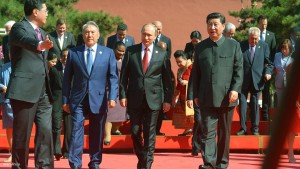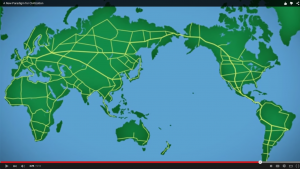8. september 2015 – European Leadership Network (ELN), en tænketank, der består af fhv. europæiske og russiske forsvars- og udenrigsministre og andre eksperter på højt niveau, har netop udgivet en fornyet hasteappel for »nye fælles forholdsregler for NATO og Rusland for at forhindre en militær konfrontation i Europa«.
For mindre end en måned siden, den 12. august, udgav ELN et dokument, der erklærede, at »NATO-Ruslandsrådet bør hasteindkaldes« for at vedtage et Forståelsesmemorandum, der fastlægger bestemmelser for »sikkerheden ved træfninger i luft og på vand mellem de to sider«.
Som den nye ELN-meddelelse erklærer: »De nye gruppe af underskrivere bag disse forslag lægger yderligere vægt til dem, der udtrykker bekymring for den kurs, som de politiske og militære relationer mellem Rusland og Vesten har.« Dokumentet fra august måned erklærede åbenhjertigt: »Rusland forbereder sig på en konflikt med NATO, og NATO forbereder sig til en mulig konfrontation med Rusland.« Som Helga Zepp-LaRouche skrev dengang: »Det eneste, der er forkert i denne undersøgelse, er den antagelse, at en sådan krig ville være begrænset til Europa. Det ligger i sådanne tings natur, at en sådan krig omgående ville blive en global atomkrig og ville føre til den menneskelige arts udslettelse.«
De 75 sikkerheds-ledere inkluderer to fhv. NATO-generalsekretærer (Javier Solana og Jaap de Hoop Scheffer); fhv. allieret næstkommanderende for Europa, SACEUR, (John McColl, 2007-11); flere fhv. forsvarsministre (inkl. Frankrigs Alain Richard, Tysklands Volker Rühe og Polens Janusz Onyskiewicz); flere fhv. udenrigsministre (inkl. Ruslands Sergei Ivanov og Boris Pankin, Det forenede Kongeriges, U.K.’s Malcolm Rifkind og Danmarks Uffe Ellemann-Jensen); og andre, højtrespekterede sikkerhedsledere (såsom Tysklands Wolfgang Ischinger og U.K.’s general, Sir David Richards).
ELN INCIDENT MAP 2014:
1) 3 March: Near-collision between airliner and Russian aircraft
INCIDENT: A commercial airline narrowly avoids collision with a Russian recon aircraft due to the latter’s not broadcasting its position.
CATEGORY: High Risk. Had a collision occurred, this would have caused a major diplomatic response, condemnation and further isolation of Russia.
2) June: Simulated attack by Russian aircraft on Denmark
INCIDENT: Armed Russian aircraft approach the heavily populated Danish island of Bornholm before breaking off in what appears to have been a simulated attack.
CATEGORY: Serious. The Danish intelligence service described the incident as “of a more offensive character than observed in recent years.” At the time of the simulation, the island in question was hosting a major meeting of Danish politicians and journalists.
- 3) 16 July: Provocative Russian action aimed at Swedish aircraft
INCIDENT: Armed Russian aircraft intercepts Swedish surveillance plane conducting operations between Gotland and Latvia in international airspace, flies 10 metres from the plane.
CATEGORY: Serious. Indicated more aggressive approach by intercepting aircraft than in previous encounters.
- 4) 18 July: US aircraft violates Swedish airspace to avoid Russian interceptor
INCIDENT: American surveillance plane conducting operations near Kaliningrad takes refuge in Swedish air-space after being approached by Russian fighters. This evasive action takes place without prior Swedish approval.
CATEGORY: Serious. Indicated more aggressive approach by intercepting aircraft than in previous encounters and forced the U.S. aircraft to violate Swedish airspace
- 5) August 2014: Multiple breaches of Finnish air-space by Russian state aircraft
INCIDENT: Multiple breaches of Finnish air-space by Russian state aircraft.
CATEGORY: Serious. Finland has already articulated that it will respond more firmly to future violations, this is already an escalation.
- 6) 5 September: Abduction of an Estonian security service operative
INCIDENT: Estonian security service operative captured by Russian agents on Estonian territory in a raid involving communications jamming and smoke grenades. Incident took place immediately after Obama’s assurances to the Baltic States.
CATEGORY: High Risk. Incursion into NATO member state’s territory. Had the Estonian official or his colleagues resisted, fatalities on either side would have been a catalyst for further escalation.
- 7) 17 September: Violation of Swedish airspace
INCIDENT: Two Russian military aircraft cross into Swedish air-space south of the island of Oland.
CATEGORY: Serious. Su-24 bombers intentionally violated Swedish airspace. Swedish Foreign Minister described it as ‘most serious aerial incursion’ in years.
- 8) 17 – 27 October: Swedish ‘underwater activity’ hunt
INCIDENT: Major submarine hunt prompted by reports of “underwater activity” in Swedish territorial waters.
CATEGORY: High Risk. Biggest anti-submarine operation in Sweden since the Cold War.
- 9) 28 – 30 October: Massive surge of Russian aviation activity along NATO borders
INCIDENT: In a series of developments, aircraft from Nato states and partners track Russian long-range bombers conducting missions over the North Sea, Atlantic and the Black Sea, as well as a big formation of Russian fighter and bombers conducting missions over the Baltic Sea; all missions conducted in international airspace
CATEGORY: Serious. Large-scale Russian air operation involving different kind of aircraft and different zones of operation. While no incursion into any national airspace was reported, the operation added to increased tensions along the Nato-Russia borders.
- 10) 28 – 30 October: Massive surge of Russian aviation activity along NATO borders
INCIDENT: In a series of developments, aircraft from Nato states and partners track Russian long-range bombers conducting missions over the North Sea, Atlantic and the Black Sea, as well as a big formation of Russian fighter and bombers conducting missions over the Baltic Sea; all missions conducted in international airspace
CATEGORY: Serious. Large-scale Russian air operation involving different kind of aircraft and different zones of operation. While no incursion into any national airspace was reported, the operation added to increased tensions along the Nato-Russia borders.



